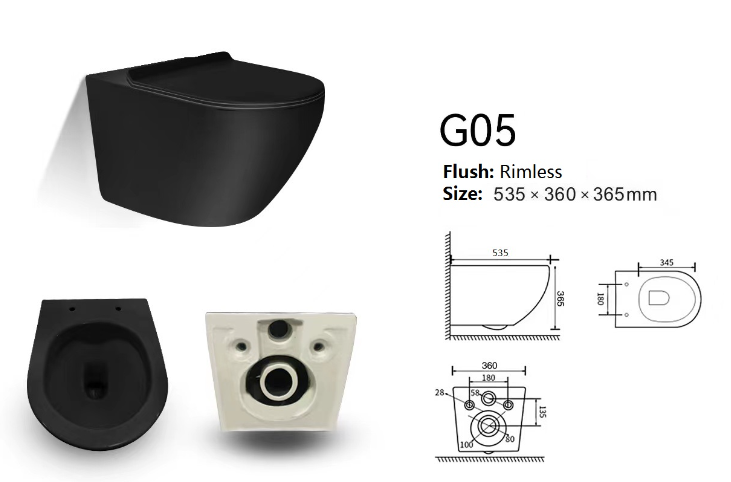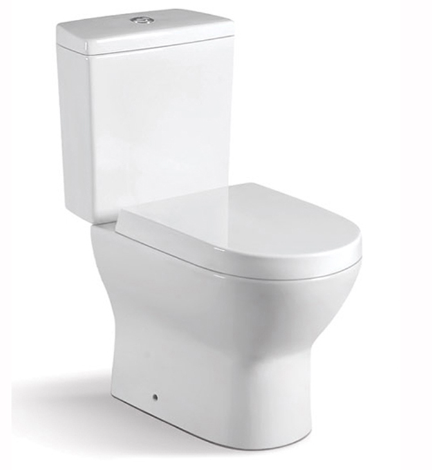Wall Mounted Toilets vs. Floor Mounted Toilets
When it comes to choosing a toilet, there are two main types to consider: wall-mounted and floor-mounted. While both serve the same basic function, there are important differences to consider when deciding which type of toilet is right for your bathroom. In this article, we'll take a closer look at the pros and cons of wall-mounted and floor-mounted toilets, and help you decide which one is the best choice for your home.
Before we get into the details, let's start with a brief overview of the two types of toilets being compared: wall-mounted and floor-mounted. Wall-mounted toilets are mounted directly to the bathroom wall, with the tank hidden behind the wall. Floor-mounted toilets, on the other hand, are mounted to the bathroom floor, with the tank visible behind the bowl.
Before we get into the details, let's start with a brief overview of the two types of toilets being compared: wall-mounted and floor-mounted. Wall-mounted toilets are mounted directly to the bathroom wall, with the tank hidden behind the wall. Floor-mounted toilets, on the other hand, are mounted to the bathroom floor, with the tank visible behind the bowl.
What are Wall-Mounted Toilets?
First, let's take a closer look at wall-mounted toilets. These toilets have become increasingly popular in recent years, thanks in part to their space-saving design and modern appearance. Here are some advantages and disadvantages to consider:
Advantages of Wall-Mounted Toilets
●Space-saving design: Since the tank is hidden behind the wall, wall-mounted toilets take up less space in the bathroom, making them a great choice for smaller bathrooms or those with limited space.
●Easier to clean: Without a visible tank or base, wall-mounted toilets are generally easier to clean than floor-mounted toilets. This is especially true for the area around the base, which can be a tough spot to clean on a floor-mounted toilet.
●Modern and stylish appearance: Wall-mounted toilets have a sleek, modern appearance that can add a touch of style to any bathroom.
Disadvantages of Wall-Mounted Toilets:
●Higher installation costs: Wall-mounted toilets require a more complex installation process, which can be more expensive than installing a floor-mounted toilet.
●Limited availability of compatible parts: Since wall-mounted toilets are still relatively new to the market, it can be more difficult to find compatible replacement parts if something breaks or needs to be replaced.
●May require additional structural support: Depending on the weight of the toilet and the condition of the bathroom wall, it may be necessary to add additional structural support to the wall to ensure the toilet is securely mounted.
●Limited availability of compatible parts: Since wall-mounted toilets are still relatively new to the market, it can be more difficult to find compatible replacement parts if something breaks or needs to be replaced.
●May require additional structural support: Depending on the weight of the toilet and the condition of the bathroom wall, it may be necessary to add additional structural support to the wall to ensure the toilet is securely mounted.
What are Floor-Mounted Toilets?
Now, let's take a closer look at floor-mounted toilets. These toilets have been the standard for many years, and remain a popular choice for homeowners. Here are some advantages and disadvantages to consider:
Advantages of Floor-Mounted Toilets:
●Widely available and compatible with standard parts: Since floor-mounted toilets have been around for so long, they are widely available and compatible with standard replacement parts. This makes it easier to find and replace parts as needed.
●Lower installation costs: Installing a floor-mounted toilet is generally less complex and therefore less expensive than installing a wall-mounted toilet.
●More traditional appearance: For those who prefer a more traditional look, floor-mounted toilets are a great choice.
●Lower installation costs: Installing a floor-mounted toilet is generally less complex and therefore less expensive than installing a wall-mounted toilet.
●More traditional appearance: For those who prefer a more traditional look, floor-mounted toilets are a great choice.
Disadvantages of Floor-Mounted Toilets:
●More difficult to clean: As mentioned earlier, the area around the base of a floor-mounted toilet can be difficult to clean.
●Take up more space: Floor-mounted toilets require more space than wall-mounted toilets, which can be a problem in smaller bathrooms.
●Can be less aesthetically pleasing: While some people prefer the traditional look of a floor-mounted toilet, others may find them less aesthetically pleasing than their wall-mounted counterparts.
●Take up more space: Floor-mounted toilets require more space than wall-mounted toilets, which can be a problem in smaller bathrooms.
●Can be less aesthetically pleasing: While some people prefer the traditional look of a floor-mounted toilet, others may find them less aesthetically pleasing than their wall-mounted counterparts.
Comparison of Wall-Mounted and Floor-Mounted Toilets
Now that we've looked at the advantages and disadvantages of each type of toilet, let's compare them side by side. When deciding between a wall-mounted and floor-mounted toilet, here are some factors to consider:
●Bathroom size: If you have a smaller bathroom or limited space, a wall-mounted toilet may be a better option since it takes up less space. However, if you have a larger bathroom, a floor-mounted toilet may work just as well.
●Design preferences: If you prefer a more modern and sleek look, a wall-mounted toilet may be the best choice. On the other hand, if you prefer a more traditional look, a floor-mounted toilet may be a better fit for your bathroom's design.
●Cleaning ease: If cleaning ease is a priority for you, a wall-mounted toilet may be the better option since it is generally easier to clean than a floor-mounted toilet.
●Installation costs: If you are on a tight budget, a floor-mounted toilet may be the better option since it is generally less expensive to install than a wall-mounted toilet.
●Replacement parts availability: If finding replacement parts easily is important to you, a floor-mounted toilet may be a better option since they are widely available and compatible with standard parts.
●Bathroom size: If you have a smaller bathroom or limited space, a wall-mounted toilet may be a better option since it takes up less space. However, if you have a larger bathroom, a floor-mounted toilet may work just as well.
●Design preferences: If you prefer a more modern and sleek look, a wall-mounted toilet may be the best choice. On the other hand, if you prefer a more traditional look, a floor-mounted toilet may be a better fit for your bathroom's design.
●Cleaning ease: If cleaning ease is a priority for you, a wall-mounted toilet may be the better option since it is generally easier to clean than a floor-mounted toilet.
●Installation costs: If you are on a tight budget, a floor-mounted toilet may be the better option since it is generally less expensive to install than a wall-mounted toilet.
●Replacement parts availability: If finding replacement parts easily is important to you, a floor-mounted toilet may be a better option since they are widely available and compatible with standard parts.
Conclusion
Choosing between a wall-mounted and floor-mounted toilet ultimately comes down to personal preference, budget, and bathroom design. While wall-mounted toilets offer a modern and space-saving design, they can be more expensive to install and may require additional structural support.
Floor-mounted toilets, on the other hand, are widely available and generally less expensive to install, but take up more space and can be more difficult to clean. Consider your personal preferences and priorities when making your decision, and consult with a professional plumber if you have any questions or concerns.
Floor-mounted toilets, on the other hand, are widely available and generally less expensive to install, but take up more space and can be more difficult to clean. Consider your personal preferences and priorities when making your decision, and consult with a professional plumber if you have any questions or concerns.



